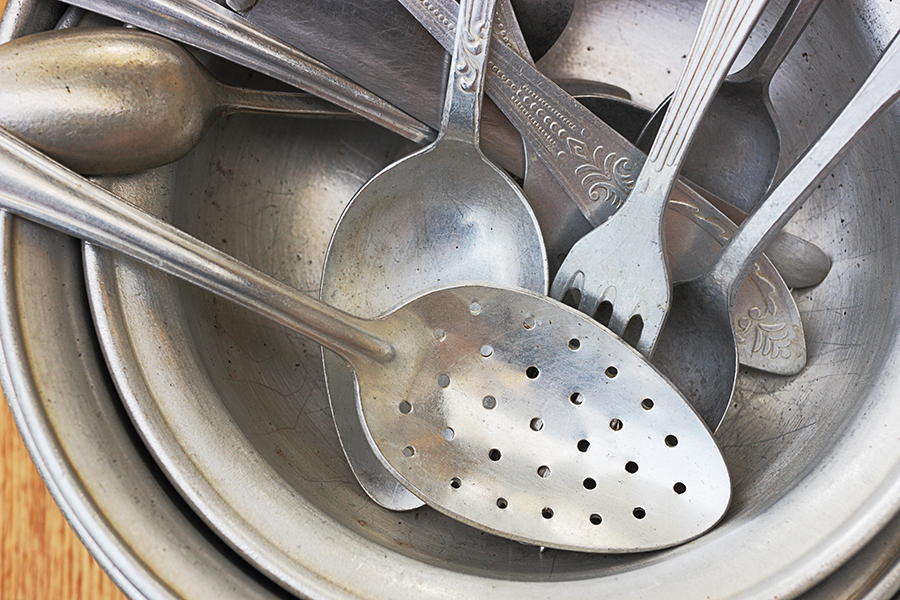Is Cooking With Aluminum Pans A Health Risk?

In the last several years, more information has surfaced about the safety of chemicals used to create Teflon (PTFE) and other non-stick surface coated pans. It was found that with use, scraping food with utensils could cause tiny flecks of these chemical-based surfaces to get into your food. Even though the U.S. Environmental Protection Agency had deemed that ingesting small particles of these pan surfaces has not been shown to cause any real health problems, many of my patients decided to throw out their non-stick cookware and switch back to cast iron or aluminum.
Cast iron cookware has been around forever and can even offer some health benefits, particularly to people who may not get enough iron in their diets. However, for other people – like postmenopausal women – additional iron in your diet may set the stage for heart disease through iron overload. Of course, there are ceramic and copper-coated cookware that have various pros and cons, but many people still want to use aluminum – particularly the “new” aluminum. That’s what I’d like to talk to you about here – whether using aluminum cookware poses a health risk to you.
Aluminum Cookware Safety
Back around 1970, a Canadian research team found that there was a connection between the aluminum in the diet and the development of Alzheimer’s disease. High levels of aluminum concentrations were found in the brains of Alzheimer patients on autopsy. It wasn’t determined, though, if the aluminum ingestion came first or if the aluminum deposits in the brain were a result of the Alzheimer disease itself. News of this research surfaced though and an aluminum scare was born.
As a result, aluminum cans were lined with a ceramic coating and the use of aluminum foil and aluminum cookware decreased. You may be surprised to learn however, that you cannot completely get away from aluminum simply by changing cookware. It is also present in many other products you use on a daily basis as well as the air you breathe, the water you drink and the dirt you garden and walk around in. Unless you stop using all these products, you are going to be exposed to aluminum in your environment. They include:
- Baking powder
- Soda in cans
- Toothpastes, deodorants, sunscreens, cosmetics
- Commercial cake mixes
- Antacids, aspirin, and other over the counter medicines
- Vaccines
The New Aluminum
More recently, with the possible Alzheimer risk in mind, cookware manufacturers set out to revamp aluminum cookware. As a result, a new type of aluminum cookware – anodized aluminum – was created. Some very well-known cooks like TV’s Emeril has endorsed them – particularly one brand, All Clad, but there are several other brands like Calphalon, Anolon, et al, that are also popular. What are these new-generation aluminum pans like? Here are some of their advantages:
- Lightweight
- Conduct heat evenly and are heat resistant to 1,222 degrees Fahrenheit.
- Inexpensive
- Resist abrasion and corrosion
- Durable, very long life span
The manufacturers of anodized aluminum cookware explain ‘anodization’ of aluminum as an ‘electro-chemical process that hardens aluminum making it harder than stainless steel’. The anodized finish is, they say, nontoxic and heat resistant to the melting point of aluminum. But are they safer than the old aluminum cookware?
According to the Anodized Aluminum Manufacturers, anodized aluminum cookware ‘leaches about 35 micrograms’ of aluminum into your food with each use. If you use this cookware repeatedly in a day’s time, every day of the week, you obviously are going to get more than 35 mcg. Aluminum accumulates in your body, like other metals do. People with kidney disease may have a hard time clearing it efficiently.
My Recommendation
If you are going to use anodized aluminum cookware once a day, say for breakfast or dinner, and you are in normal health without kidney function problems, this minute exposure will not be harmful. Keep in mind though, if you use the other products mentioned here, that aluminum cookware (even anodized) is not your only concern.
I would also recommend that you periodically – say once every 2 months – do a complete detox that helps remove heavy metals build-up. Cut back on your use of over-the-counter chewable antacids. Be sure to drink your required amount of water every day – half your body weight in water ounces (160 lbs = 80 ounces) – every day to help you flush toxins from your body.
Stay Well,
Mark Rosenberg, M.D.
Natural Health News
Aluminum Cookware Safety,http://environment.about.com/od/healthenvironment/a/safecookware.htm
PTFE, http://en.wikipedia.org/wiki/Polytetrafluoroethylene
Your Cookware Helper, http://yourcookwarehelper.com/cookware-and-health/12-is-anodized-aluminum-cookware-safe
